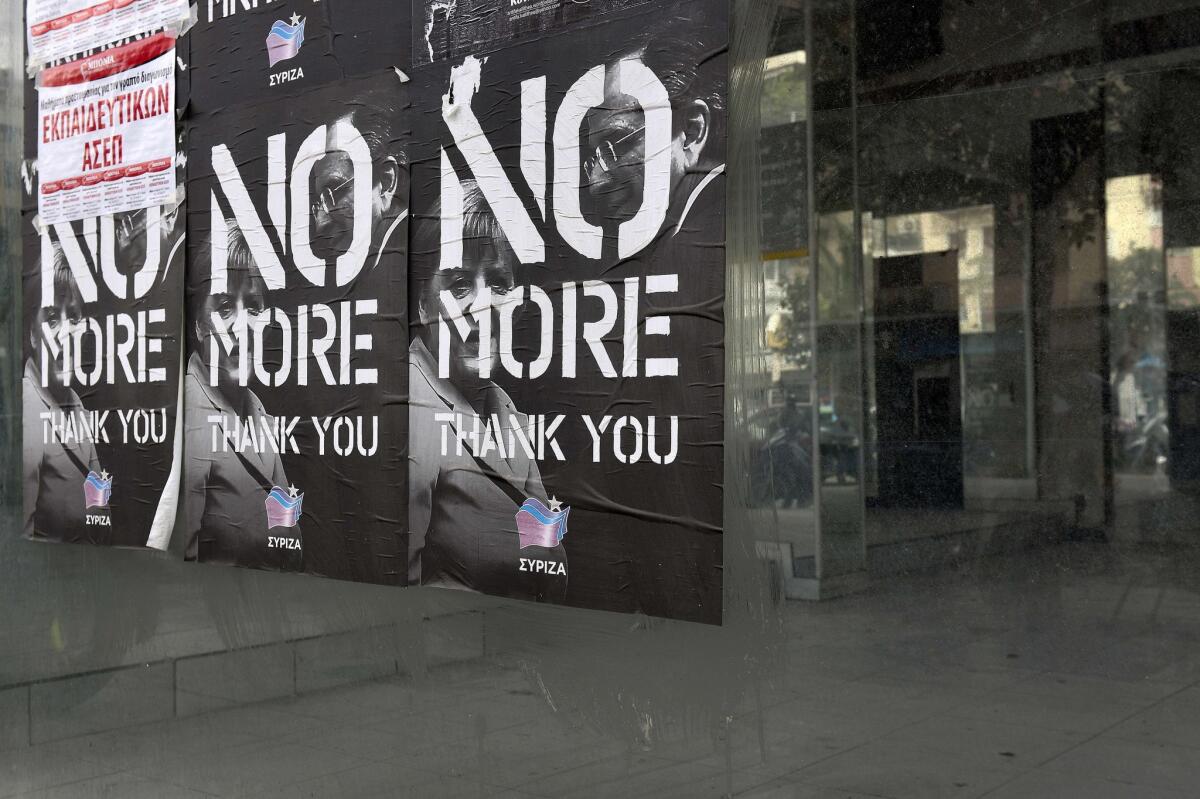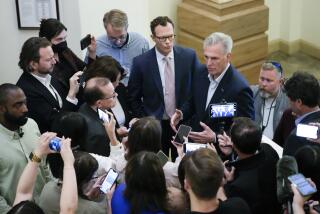Greece proposes changes to bailout terms

- Share via
Reporting from Athens — As tens of thousands of anti-austerity demonstrators poured into the streets of Greece, the new finance minister faced off Wednesday against his Eurozone counterparts in Belgium in a bid to renegotiate the nation’s bailout package.
After a six-hour emergency session in Brussels described as both tense and informal, Eurozone officials haggled over the wording of a statement following Greek Finance Minister Yanis Varoufakis’ short-term proposal to buy time and stave off a funding crunch that could push his country into default.
Dutch Finance Minister Jeroen Dijsselbloem, chairman of the Eurogroup of finance ministers, said, “There was no joint conclusion … and we didn’t even manage to set the framework for how we proceed.”
Varoufakis, whose Syriza party took power last month on a pledge to end austerity, went into his first meeting with all 18 other Eurozone finance ministers amid anxiety over a renewed crisis in Greece that could lead to its exit from the Eurozone.
Varoufakis proposed an agreement that would tweak about a third of the reforms demanded of Greece under the current bailout, which expires at month’s end. The plan would retain the remaining demands in exchange for a $9-billion increase in treasury bills the country can issue to raise cash and pay its expenses.
European leaders have repeatedly resisted efforts by Greece’s new leftist government to ease austerity measures such as cuts in government pay and other spending. On Tuesday, the European Union’s senior executive body, the European Commission, said it had low expectations that meetings of Eurozone finance ministers and EU leaders Thursday would produce a final agreement on Greece.
Athens officials agreed.
“We don’t want a blowout,” Varoufakis told Parliament before a key confidence vote Wednesday, which Syriza won. “But if you are not prepared to enter into confrontation, then there is no true room for negotiation. You may as well just sit in an office and run the country receiving emails from your lenders.”
Despite popular support, Athens doesn’t have strong leverage abroad. European banks have less exposure to Greek debt than they did a few years ago at the height of the Eurozone debt crisis, and the single-currency community has new financing mechanisms and institutions in place. Also, there’s a much smaller risk of contagion in nearby countries such as Italy and Spain, which are in better shape financially.
“The euro area isn’t going to blink,” said Jacob Funk Kirkegaard, a senior fellow at the Peterson Institute for International Economics in Washington. “The euro area is a lot more solid than in 2012. They can afford to wait.”
Officials in Athens said that before Wednesday’s meeting, Greek negotiators also met with International Monetary Fund chief Christine Lagarde and Dijsselbloem to “discuss what the interim bridge agreement could include.”
Under the Greek plan, Athens would rewrite a chunk of bailout reforms with the help of the Organization for Economic Cooperation and Development. The head of the organization, former Mexican Finance Minister Angel Gurria, was called to Athens on Wednesday for talks with Greek Prime Minister Alexis Tsipras.
Without an agreement soon, Athens and its lenders risk leaving Greece, Europe’s most indebted country, facing a cash crunch within weeks when its bailout expires Feb. 28.
Greek officials say they can tide over their country long enough to strike a deal with creditors.
“Cash reserves aside,” said Dimitris Mardas, the deputy finance minister, “we can tap into other state reserves, including state insurance funds, to cover our expenses for some time.”
He refused to say how long the reserves would last.
Before the recent turmoil, most officials believed that Athens could make it until July, when a massive $3.96-billion bond repayment is due. But with cash reserves shrinking, tax revenue dropping and capital outflow continuing, officials fear that a cash crunch could hit as early as next month, when it has to pay off a loan installment to the IMF. No developed country has defaulted on an IMF loan.
By sending mixed signals about its on-again, off-again intentions to work with creditors, Greece has taken global markets on a roller-coaster ride since Syriza surged to power last month promising to end austerity and negotiate a new debt deal with lenders.
Panos Kammenos, Greece’s defense minister, has said that failure to clinch a deal would push Athens to look elsewhere for help, including Russia and China.
Tsipras, who received Moscow’s top envoy in Athens hours after his inauguration, has neither confirmed nor denied such designs. Rather, pundits and politicians here suggest, the leftist firebrand looks poised to take Greece on another trip to the polls or hold a referendum if creditors insist on continued austerity.
On Wednesday, more than 20,000 Greeks, some waving banners reading “dignity” and “no more austerity,” stood silent before Parliament overlooking Syntagma Square, the scene of violent protests at the height of the financial crisis.
Special correspondent Carassava reported from Athens and Times staff writer Don Lee from Washington.
More to Read
Sign up for Essential California
The most important California stories and recommendations in your inbox every morning.
You may occasionally receive promotional content from the Los Angeles Times.











